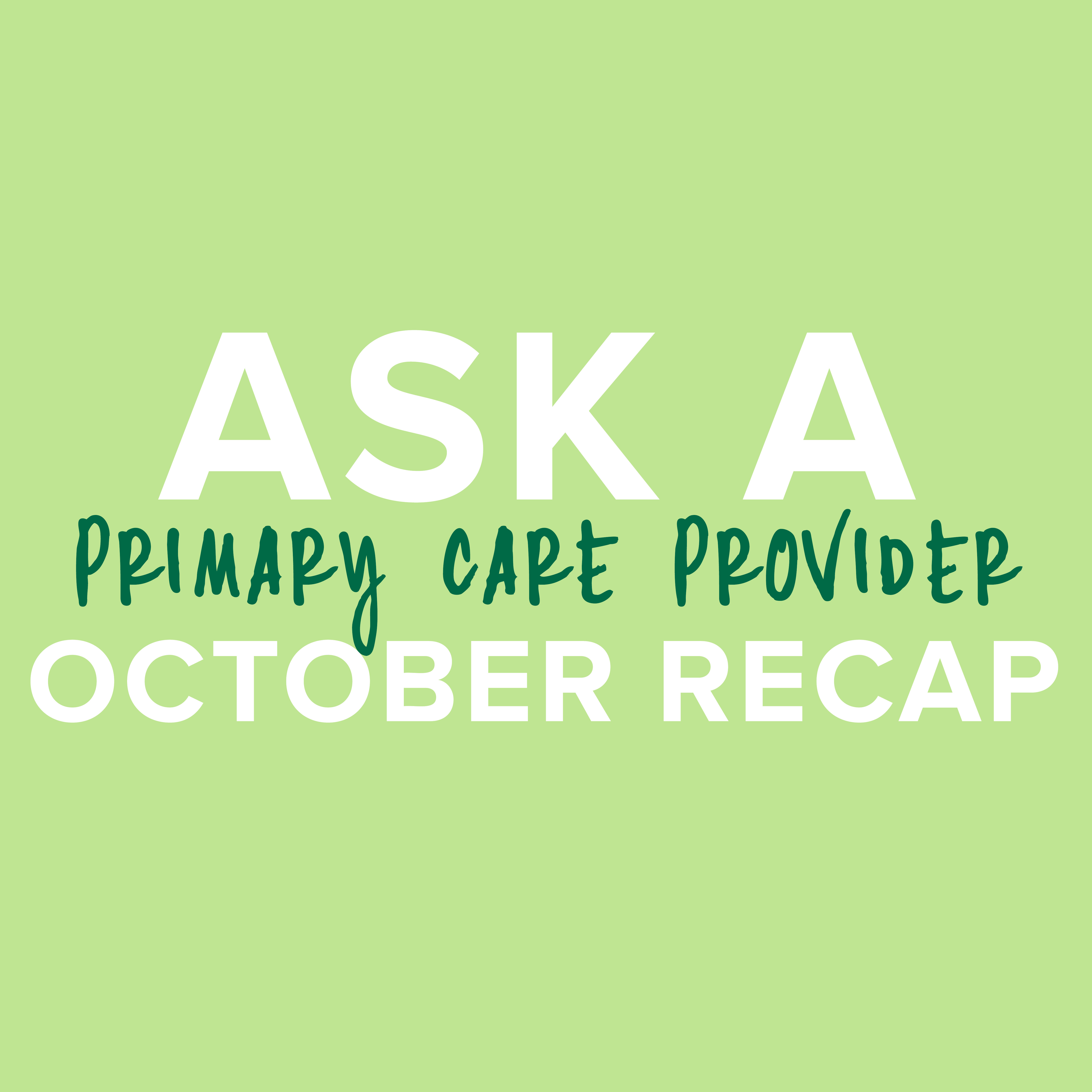
As the seasons change, different health concerns change priority in people’s lives, such as seasonal allergies, holiday-related concerns and more. Since the holidays are also a busier time of year, it can be helpful to address any possible health issues before some of the biggest holidays of the year arrive. Throughout the past month, primary care providers addressed people’s potential health inquiries during the fall season for the Department of Family and Community Medicine’s Ask a Provider social media series.
How can I keep my pollen allergies under control when the pollen count is high?
 Minakshi Shukla, M.D.Many people who breathe in lots of pollen develop uncomfortable symptoms during the fall and spring, as these seasons usually have high pollen counts. Pollen allergy symptoms can include sneezing, itchy or watering eyes, congestion and more.
Minakshi Shukla, M.D.Many people who breathe in lots of pollen develop uncomfortable symptoms during the fall and spring, as these seasons usually have high pollen counts. Pollen allergy symptoms can include sneezing, itchy or watering eyes, congestion and more.
Assistant Professor Minakshi Shukla, M.D., explained how individuals who suffer from pollen allergies could keep their symptoms from disrupting their lives. She recommended physician-approved medicine to help with the symptoms and mentioned several prevention measures people can take.
“Reduce outdoor activities when the pollen count is high. Keep pollen out of your home by keeping windows and doors closed. If you go outside, take a shower and change your clothes to wash off the allergens sticking to your clothes and body,” Shukla explained.
Minakshi recommended people visit their primary care provider if these solutions do not help.
UAB Wellness Week
 Kaylee Crockett, Ph.D.To commemorate UAB Wellness Week, the department’s social media accounts went quiet one Friday this month to raise awareness of how someone’s overall wellness can be affected by their utilization of social media.
Kaylee Crockett, Ph.D.To commemorate UAB Wellness Week, the department’s social media accounts went quiet one Friday this month to raise awareness of how someone’s overall wellness can be affected by their utilization of social media.
Assistant Professor, Clinical Health Psychologist and Clinical Scientist Kaylee Crockett, Ph.D., gave her advice on ways to handle social media today in an article this past spring. Some of her suggestions included being intentional about following social media accounts, using social media for only a certain amount of time each day and more.
For those who may be dealing with mental health issues, scheduling an appointment with a primary care provider can be a significant first step to finding overall wellness.
How can I help my children learn healthy boundaries with Halloween candy?
 Tori Faught, M.S., R.D.N., L.D.Halloween is a fun holiday that can be full of good memories and costumed fun. Many children also go trick-or-treating, which means they usually bring home a lot of candy. Teaching them how to enjoy the holiday while still balancing candy with other foods is an interest Tori Faught, M.S., R.D.N., L.D., and Caroline Cohen, Ph.D., R.D., L.D., the department’s registered dietitians, discussed this month.
Tori Faught, M.S., R.D.N., L.D.Halloween is a fun holiday that can be full of good memories and costumed fun. Many children also go trick-or-treating, which means they usually bring home a lot of candy. Teaching them how to enjoy the holiday while still balancing candy with other foods is an interest Tori Faught, M.S., R.D.N., L.D., and Caroline Cohen, Ph.D., R.D., L.D., the department’s registered dietitians, discussed this month.
Though Faught says all parents should make their own decision about what’s best for their family, she thinks parents have no need to severely limit the amount of candy their children eat on Halloween.
“The most important thing to remember is that Halloween is a one-day thing and that it is okay if your kids indulge a little more on candy than usual,” Faught advised.
In this situation, Faught acknowledged the number of sweets at Halloween could cause parents to get nervous but said there are a few critical concepts they should keep in mind.
 Caroline Cohen, Ph.D., R.D., L.D.“As parents, it is important to teach our children how to fuel their bodies with nutrient-dense foods most often while enjoying pleasurable foods in moderation. It is also important to avoid labeling candy or any food as ‘good’ or ‘bad’ because this can lead to feelings of shame or guilt when certain foods are eaten, which can ultimately lead to an unhealthy relationship with food,” Faught said.
Caroline Cohen, Ph.D., R.D., L.D.“As parents, it is important to teach our children how to fuel their bodies with nutrient-dense foods most often while enjoying pleasurable foods in moderation. It is also important to avoid labeling candy or any food as ‘good’ or ‘bad’ because this can lead to feelings of shame or guilt when certain foods are eaten, which can ultimately lead to an unhealthy relationship with food,” Faught said.
With all of this in mind, Cohen offered some practical tips on how to handle Halloween night.
“Prep for trick or treating by providing a balanced meal ahead of time; after trick-or-treating, sort through candy and remove any choking hazards; let kids sample the candy and enjoy it. Food is fun and an important part of celebrations!”
Want more advice? Follow the department on social media and stay tuned for more Ask a Provider posts.